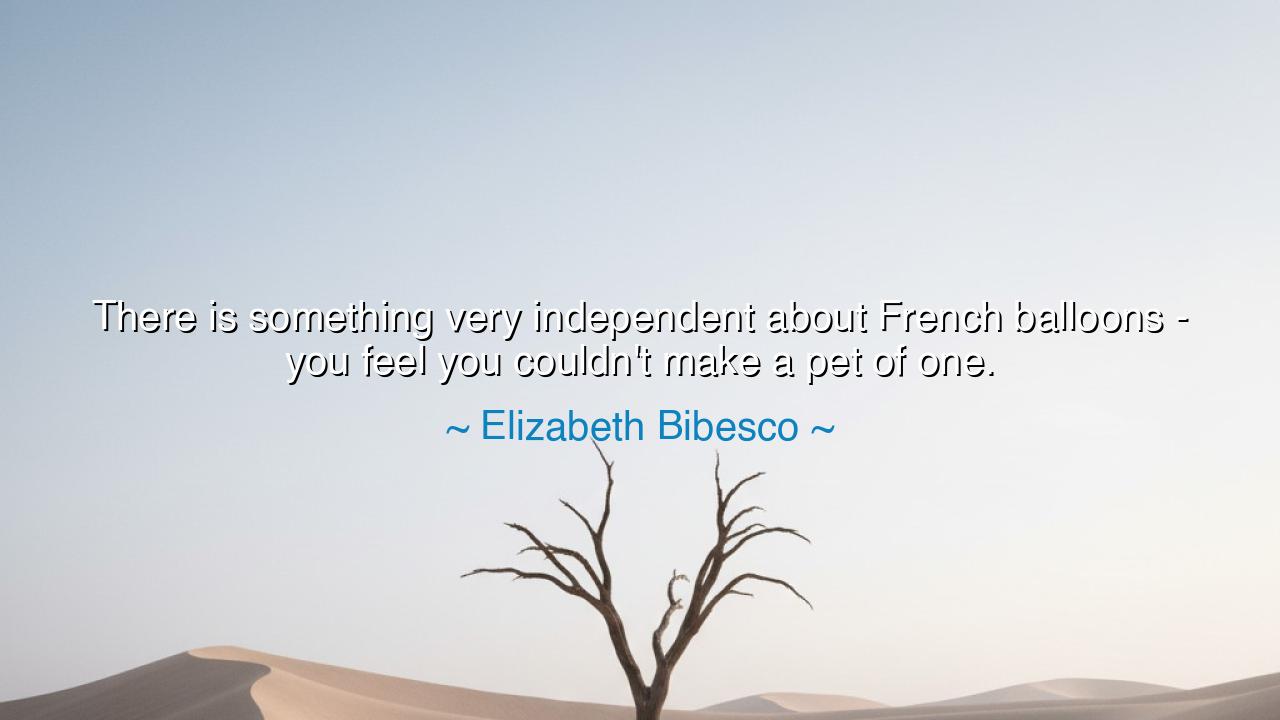
There is something very independent about French balloons - you
There is something very independent about French balloons - you feel you couldn't make a pet of one.






Elizabeth Bibesco once observed with delicate wonder: “There is something very independent about French balloons—you feel you couldn’t make a pet of one.” At first, these words may appear whimsical, a fleeting thought about fragile orbs that rise into the sky. Yet beneath their playful surface lies a truth as deep as the currents of the human spirit: some things, and some beings, are not meant to be possessed. They carry within them the essence of freedom, the refusal to be bound, the innate longing to rise beyond grasp.
The balloon, drifting skyward, becomes a symbol of all that is uncontainable. Bright, colorful, and seemingly fragile, it nevertheless resists the hand that would hold it forever. To attempt to make a pet of it—to tether it as one would a creature—is to misunderstand its very nature. For while a balloon may rest in your hand for a time, its destiny is always the heavens, its essence always movement, detachment, and flight. Bibesco, in her poetic wisdom, recognized that the independence of such a simple object reflects a larger truth about life itself: not everything we love can be kept.
The ancients knew this lesson well. Consider the Greek myth of Icarus, who bound himself to the air with wings of wax and feather. His desire was to claim the sky, to make the domain of the gods his own. Yet the heavens are not a pet to be mastered—they are freedom itself. Icarus rose, but his fall was the price of forgetting that some realms are to be admired, not possessed. So too with the balloon: its beauty lies not in ownership, but in its brief, joyous rebellion against gravity before it vanishes into the horizon.
History too offers reminders. The Montgolfier brothers of France, who first sent great balloons aloft in the eighteenth century, sparked awe across Europe. Crowds gathered to watch sheep, ducks, and even men ascend into the heavens. These floating marvels embodied the human dream of freedom, yet no one thought to keep them caged. Their independence was their glory, and to watch them ascend was to feel, even for a moment, the taste of eternity. Bibesco’s reflection draws from this cultural memory, where the French balloons became symbols of daring and imagination, resisting domestication, insisting on wonder.
Her words also speak to the human heart. We often wish to hold fast to people, to moments, to joys, and treat them as if they were ours to command. Yet the truth is that the noblest spirits are like the balloon—they cannot be tethered without losing their essence. A child grows and must leave, a friend follows their own path, a love sometimes belongs more to the wind than to our embrace. To attempt to make such souls into pets, into possessions, is to crush what made them radiant in the first place.
Thus the lesson unfolds: honor the independence of what you love. Do not cage the free, do not demand that the wind be still, do not clutch so tightly that the beauty you seek to preserve is destroyed in your grasp. To truly love is not to possess but to release, to allow the beloved to soar in their own nature, even if that means they drift beyond your sight.
Practical action follows this wisdom. When you find yourself drawn to something—be it a person, a creation, or even a fleeting joy—cherish it, but do not bind it. Admire without chaining, support without controlling, love without owning. Celebrate the soaring of others as if it were your own, for in their freedom, your spirit too is lifted. Just as we watch the balloon rise into the endless sky with both delight and a touch of sorrow, so too must we watch those we love choose their paths. In that bittersweet act lies the highest form of love.
Thus Elizabeth Bibesco’s gentle words echo like prophecy: Some things are too free to be made into pets. Respect their independence, rejoice in their flight, and learn that true possession lies not in holding, but in honoring. For what rises beyond our grasp may yet dwell forever in our memory, shining with the beauty of what was never ours to cage.






AAdministratorAdministrator
Welcome, honored guests. Please leave a comment, we will respond soon